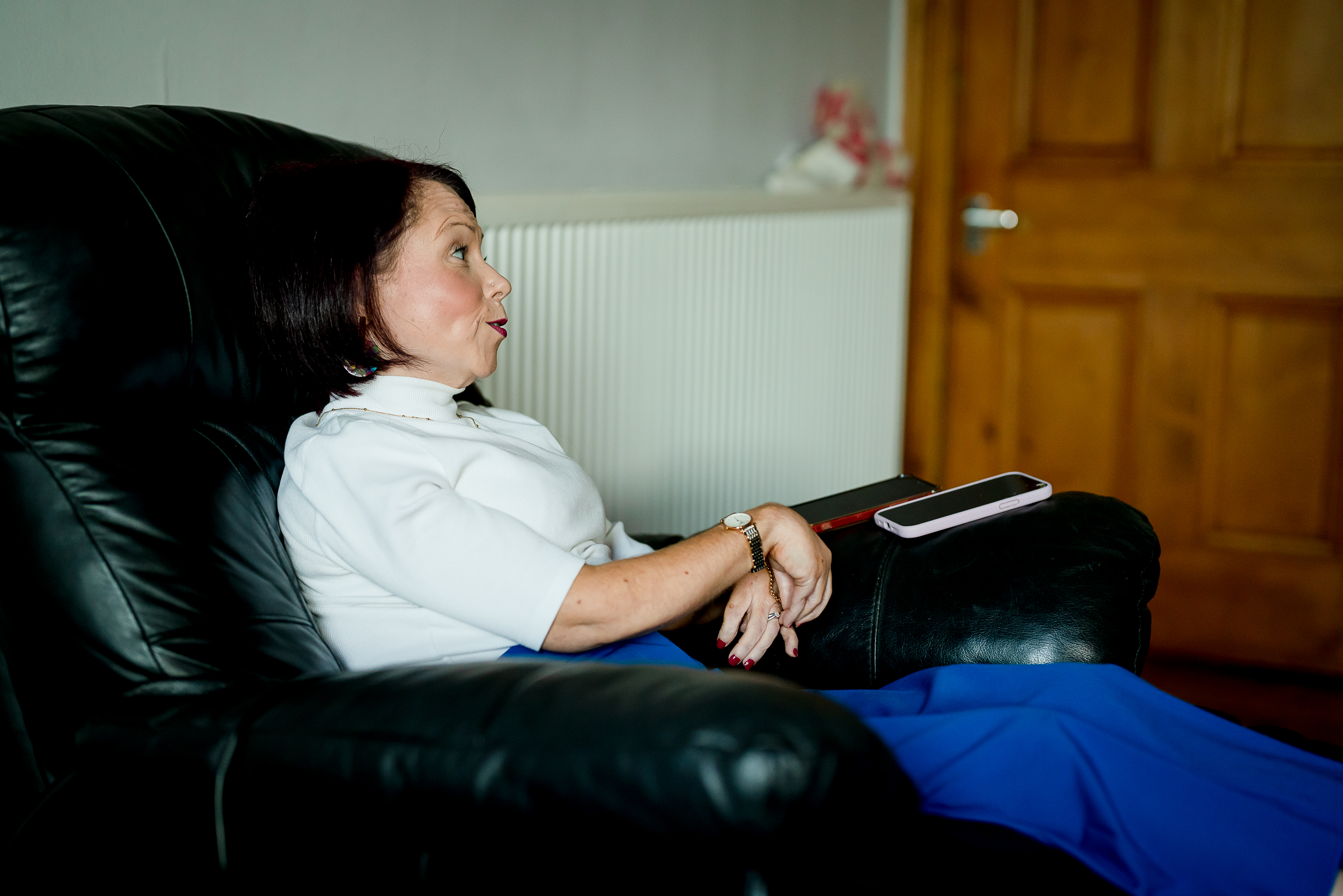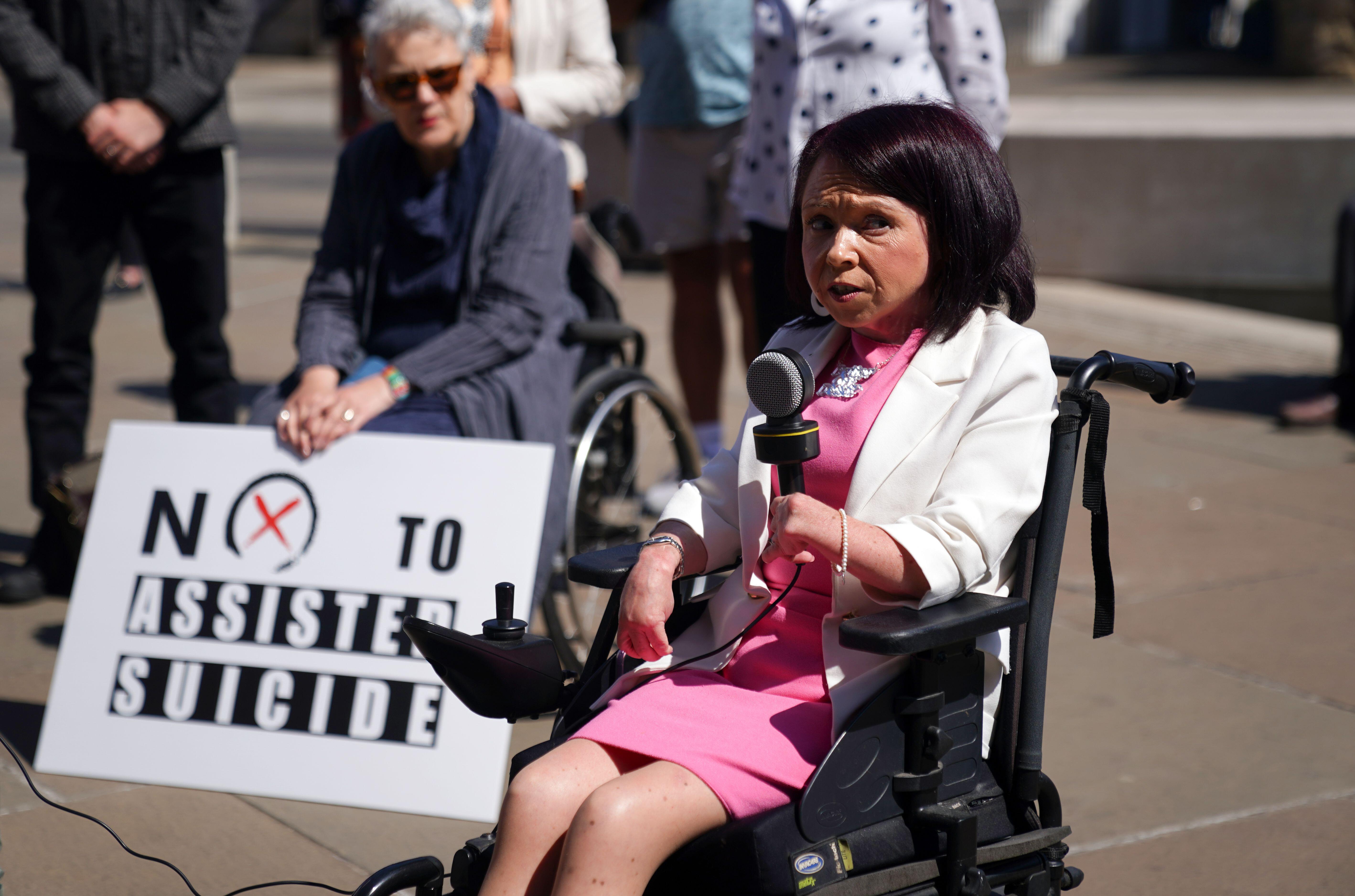Pam Duncan-Glancy: If you’re not a disabled person, it can be difficult to imagine that there is life after the ability to talk, walk and breathe
Imagine, just for a moment, being told that if someone had your life, they wouldn’t want to live. And now imagine having the state agree. You can choose to die because others don’t consider your life one worth living.
That, according to Pam Duncan-Glancy, is what makes the assisted dying legislation currently going through both Holyrood and Westminster so dangerous.
While the Labour MSP also has concerns about coercion, widening eligibility, and how it could change the nature of healthcare delivery, the most pernicious aspect of the bill is the value it places – or rather, doesn’t place – on disabled lives.
“Allowing the state to make a decision about when somebody should be assisted to die on the basis of a subjective level of tolerance, on a multifaceted question, is in my view a dangerous move,” Duncan-Glancy says.

It’s an emotive subject, and while she is clearly worried about the possibility of assisted dying being legalised, she speaks calmly and thoughtfully on the topic. It’s no surprise she has become one of the leading voices in the parliament against the Assisted Dying for Terminally Ill Adults (Scotland) Bill brought forward by Lib Dem MSP Liam McArthur. Indeed, her engagement on the issue has won her plaudits from across the chamber, both from those who agree with her and those who don’t.
MSPs made history in May when, by a margin of 14 votes, they agreed to the general principle of the bill. It is the third time such legislation has come before Holyrood, but the first time it has proceeded beyond this point. Yet during the debate, several MSPs put on record their concerns and said they may change their minds if safeguards were not added at the amending stages.
Duncan-Glancy believes that during this further consideration, her colleagues will come to realise that no amendment could make the bill safe. “We need eight people to change how they voted in order for the bill to not go through at stage three – and there were more than eight people with serious concerns during that stage one debate. On that basis, I’m confident that when members look at the detail of what this actually means… they’ll see that there is no amendment that can safeguard the risks that the bill poses,” she says.
Many supporters of the bill are quick to dismiss the concern about the unintended negative consequences for disabled people. It is strictly drawn, advocates argue, to only cover those dying from a terminal illness. But defining what constitutes a terminal illness is difficult.
At present, the bill before the Scottish Parliament states: “A person is terminally ill if they have an advanced and progressive disease, illness or condition from which they are unable to recover and that can reasonably be expected to cause their premature death”. Duncan-Glancy is concerned about how broad this definition is, warning that it describes many disabilities that most people would not consider to be a terminal illness.
I worry about losing what little function I’ve got. But I wouldn’t rather be dead
Her Labour colleague Daniel Johnson – who backed the bill at stage one – is seeking to rectify this by replacing “premature death” with “death within six months”. This would bring it into line with the legislation down in Westminster, brought forward by MP Kim Leadbeater.
“The most significant difference in Kim’s bill to Liam’s bill is of eligibility, and in my mind Liam’s is a bit more dangerous than Kim’s for that reason. Kim’s was dangerous and still is dangerous, but Liam’s is more so,” Duncan-Glancy explains. And while Johnson’s amendment would go some way to limiting eligibility in the Holyrood legislation, she says it would not provide her “any more confidence” about its operation.
“Making an assessment about whether or not someone will die within six months is difficult to do and most physicians will say the same… Whilst I think what Daniel is doing is seeking to address that issue about premature death – I mean, being homeless is a precursor to a premature death, it shouldn’t be and it’s a disgrace, but it’s true; having a learning disability is a precursor to a premature death, I don’t think anybody would argue that those two criteria should be considered an appropriate reason to end someone’s life by the state, or indeed themselves, for that matter. So, it’s obviously an improvement in that respect, but it doesn’t give me confidence, because there is not a lot of confidence in that prognosis.”
Away from the technical and practical details, she is most concerned the unintended consequence about what it does “to a society that already doesn’t appreciate and value disabled people on an equal basis to anyone else”.
“The danger in the bill is around the perception that it gives to loss of function. The ‘I would not want to live if I could not…’ And that’s the point at which you begin to question, how early can you end your life? If I lost function, if I was unable to breathe myself, speak for myself, or eat by myself, would I want to live anymore?
“Most people are frightened of that loss – and by the way, I get that. I can’t do anything for myself, very little, I can speak but I can’t do much else for myself and I worry about losing what little function I’ve got. But I wouldn’t rather be dead.
“I’m 43 years old and it’s taken me a long time to respect and appreciate the value of disabled people’s lives, but it’s only through being a disabled person that I’ve begun to understand that. And if you’re not a disabled person, it can be very difficult to imagine that there is life after the ability to talk, walk and breathe by yourself.”
 Credit: PA Images
Credit: PA Images
Duncan-Glancy’s rallying call at the end of her stage one speech was: “Colleagues, rather than legislate to assist people to die, let us resolve to legislate to assist people to live.”
It is addressing the inequalities that disabled people face which shapes much of her thinking around this bill – and indeed her approach to policy more broadly. She argues that for too many disabled people, their lives are made intolerable not by their disability but by the “internalised everyday ableism and discrimination that make us feel like we cannot go on”.
Is there a world in which, all else being equal – where inequality has been tackled and disabled people are properly supported, as big a hypothetical as that may seem – Duncan-Glancy would ever support assisted dying?
“I mean, I’m in politics because I want to create the utopia you’ve just described – which doesn’t include ending people’s lives, incidentally. It includes supporting them, and I don’t think that even in a utopia we should be in a situation where we would say the state will actively end your life. What we should do is say the state will ensure that you have a good death. And that’s different. Those two things are different… That’s the kind of egalitarian utopia that I would like us to live in, where we all had a right to a good life and a good death.”
I do try my very best to make sure that what disabled people say and think and hear and believe is represented in the parliament
When she was elected in 2021, Duncan-Glancy became the first full-time wheelchair user in parliament. She’s also one of very few visibly disabled MSPs. As a result, she’s often expected to represent the view of disabled people – something that weighs on her mind every day.
“I’m acutely aware that as somebody who’s a member of the Scottish Parliament, I am incredibly empowered as a disabled person, far more so than others. I take that responsibility very, very heavily and seriously because whilst I don’t and can’t represent the views of every single disabled person in Scotland – and it’s arguably not my job to – I do try my very best to make sure that what disabled people say and think and hear and believe is represented in the parliament, in the chamber and committees, in private one-to-one meetings with colleagues, in shadow cabinet and other places. I recognise the responsibility that comes with being the first wheelchair user in the Scottish Parliament and I’m really proud of that.”
She says having “more disabled people in the high street and the bank, in the boardroom and in the school” – and indeed, in Holyrood – is vital to showing society that disabled people “can and do live fulfilling lives”. “But we can only do that with support, and that is what we don’t have yet. We don’t have enough care and support to mean that we can always get out of bed in the morning when we want to, or we can have our lunch when we want to eat, or we can go to work when we want to go to work, or we can find an employer that believes that we can do the job that they want us to do. All of that needs to change. That’s why I’m in politics.”
What changes could the Scottish Parliament make to improve the lives of disabled people? Without missing a beat, she reels off a long list spanning a range of policy areas from accessible housing to employment. But top of the list is improvements to social care – and specifically, setting up a National Care Service.

But that is one piece of legislation which has not made it through this parliamentary year. Ministers scrapped the National Care Service Bill, renaming it the Care Reform Bill and removing any reference to setting up a new body, following significant pushback from councils and trade unions. Duncan-Glancy said she was “really disappointed” in how that whole conversation went, particularly given her party has been supportive of such a service being created for 15 years.
“We were at the forefront of the development of a National Care Service, but a National Care Service that delivers on the principles of the scale of the huge transformation in the Bevan years,” she says. “That was what we had in mind and the SNP just couldn’t deliver it.”
The policy is one example where there is overlap between the stated aims of the SNP and Labour. That’s partly why the pitch to voters in next year’s election will be focused on Scottish Government delivery and what Labour sees as mismanagement of public finances and public services.
But a tricky 12 months in Downing Street has impacted Labour’s hopes ahead of that election. The party has found it difficult to ensure any positive moves – such as increasing the minimum wage or improving workers’ rights – make the headlines, while at the same time its most high-profile changes have been damaging.
We’re going to have the impatience for change that people have; that is natural
The rebellion over the Universal Credit and Personal Independence Payment Bill is one example, which saw ministers make last-minute concessions to avoid defeat. But Duncan-Glancy says this is proof of a government that listens and owns up to its mistakes. “They’ve not gone through what they went through, to end up pulling the bill, because they didn’t listen to people. It’s because they did listen that we’re in the situation we’re in,” she says.
She welcomes this. “The government were right to pull the Pip part of the bill. I’m pleased they have. I think what they need to do now is work very, very closely with disabled people to understand what Pip is, what it does, how it transforms and changes lives, but equally, I don’t think anyone in the disabled community or otherwise would accept that welfare is working properly… Now there is an opportunity through the Timms review for them to come together and do this well and properly and deliver what disabled people need. I’m pleased that the government have listened.”
As a result, Duncan-Glancy remains buoyant in the face of poor polling for Scottish Labour. “There’s more to do, but the direction of travel is the right one,” she says, going on to acknowledge that “people need to see more change, faster”.
“I’m out knocking doors on a weekly basis, and people are saying we need more. And my colleagues know that. We all know it and the Labour government will deliver that, I know they will. The reason I know they will is because although you say that was a rosy picture that I painted, it is an accurate one. That’s not rose-tinted glasses, that’s the facts about what the Labour government have done, and it will take time to filter down.
“The pay increase takes time for people to see a difference in their pockets, the fact that fuel is cheaper than it used to be will take time for people to see that in their pockets, the fact that we’ve had four interest rate cuts in the last year as a result of the economic growth and the work that the chancellor’s been doing will take time for people to see it in their pockets. Until they do, we’re going to have the impatience for change that people that people have; that is natural. That’s what they want.
“What does it mean for the next Scottish Parliament election? Well, we only have to look at Hamilton. People were totally fed-up of the Tories. We got rid of them. They’re fed up with the SNP. They’ve had 18 years of them… They know that if after 18 years they had the answers, they have done it. They don’t. And what I heard on the doorstep was ‘we’re fed-up of them’.”
And so, while the next few months will be a huge challenge for her party, she and her colleagues are “working day and night to make sure that we can rise to it”.
Holyrood Newsletters
Holyrood provides comprehensive coverage of Scottish politics, offering award-winning reporting and analysis: Subscribe